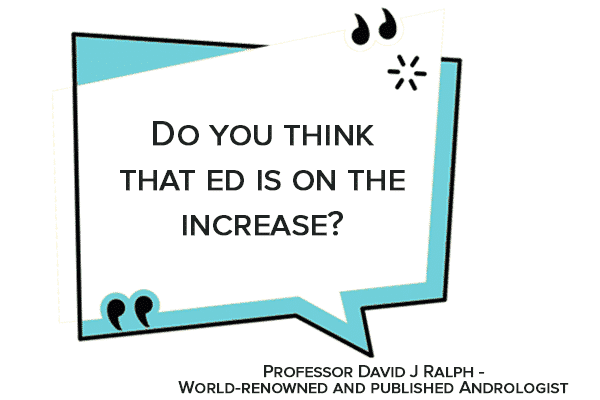What is Erectile Dysfunction?
Any man can experience sexual failure in their lifetime. It does not necessarily mean you are suffering from erectile dysfunction. Instead, learn more about erectile dysfunction, so that you can understand and diagnose it better.

At his age, any man can face sexual failure. While this phenomenon remains temporary, it is not a cause for concern and is not considered a health problem. However, if the difficulties have been persistent for over three months and repeats itself with each sexual encounter, the term erectile dysfunction may be used.
ED: Causes, diagnosis and treatment
Erectile dysfunction is an inability, (that happens for more than 3 months), to get or keep an erection firm enough to have satisfying sexual intercourse. However, even when affected by erectile dysfunction, it is quite possible to feel desire, have an orgasm and even ejaculate.
Understanding erectile dysfunction symptoms and erectile problems
Knowing when erectile dysfunction occurs will allow you to learn your symptoms as well as to assess their severity.
Erectile problems do not occur suddenly at a given moment (apart from traumatic origins e;g spinal cord injury, pelvic surgery). On the contrary, this onset is progressive and, of course, specific to each individual:
- Unaltered desire and arousal, but a difficultly achieving or even an incomplete erection
- Difficulty during penetration of the partner or an increasingly weak erection, which prevents the sexual act from being performed
- Ejaculation occurs, but with minimal rigidity
Depending on the degree of erectile dysfunction, these erectile problems can lead to the disappearance of the erection:
- Gradually, over time, the erection becomes worse. However, it should be noted that this lack of erection is often due to a pathology, following surgery, psychological causes (in 20%) or caused by physical or physiological trauma.
This guideline to erection rigidity will assist you in assessing your erectile dysfunction or in discussing it more easily with your specialist1.
Expert Opinion - Is ED on the increase?

Is Erectile Dysfunction curable?
Rest assured, having erectile dysfunction at some time in your life does not necessarily mean you will have it for the rest of your life. However, as soon as you notice a gradual increase in symptoms, you are advised to consult your doctor or nurse for guidance or to begin therapeutic management. Receiving support is reassuring and will maintain your confidence. In short, it will improve the associated psychological issues that come with ED.
Erectile problems can be linked to underlying pathologies, so it is essential to consult your doctor or nurse to identify and treat them. Priority: Don’t give up: solutions exist! Check out our articles for more information!
I am getting older : does my sex drive change?
As men get older, they may experience a change in their sex drive. Among men aged 60 to 69, approximately 34% suffer from erectile dysfunction, while in men aged between 70 and 79 years of age, 53% have the condition. By selecting cases considered “severe”, erectile problems are estimated at 15% in 70-year-old men (compared to 5% in 40-year-old men).2
Other facts about E.D:
Expert Opinion - Erectile Dysfunction in the UK

For more than 80% of men with ED, it is caused by a physical problem or disorder. Read our article about the causes of ED. The cause can usually be identified, and proper treatments can help you return to a satisfying sex life.3
In most cases, your E.D can be overcome and it’s time to find a solution.
- 1: Validation of the Erection Hardness Score, Mulhall J.-P. et al.; Journal of Sexual Medicine 2007.
- 2: Braun M et. al. Epidemiology of erectile dysfunction: results of the ‘Cologne Male Survey’. International Journal of Impotence Research (2000) 12, 305-311. https://www.nature.com/articles/3900622
- 3: Khera M, Goldstein I. Erectile dysfunction. BMJ Clin Evid. 2011 Jun 29;2011. pii: 1803. https://www.ncbi.nlm.nih.gov/pmc/articles/PMC3217797/




